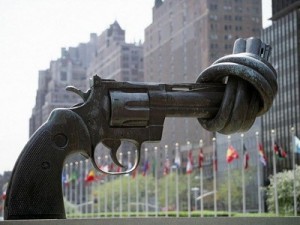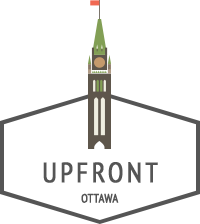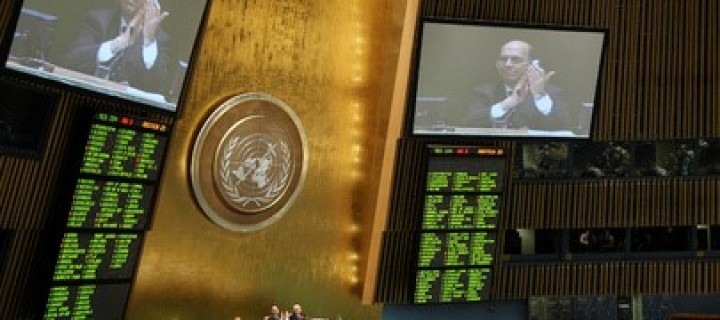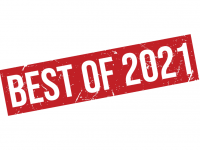Update February 2, 2017
The Arms Trade Treaty was approved by the UN General Assembly on 2 April 2013
United Nations Office of Disarmament Affairs – Strengthening Peace and Security through Disarmament
TRUDEAU-DION Foreign Policy is more than formally agreeing to the UN Arms Treaty or seeking seats on the UN Security Council. It requires principled action on the “World Stage.”
The United Nations, according to its mandate, is working “worldwide” to try and improve the lives and livelihoods of the civilian populations who suffer most by being trapped in situations of armed violence, both crime and conflict, with state armed security forces, organized criminal groups, as well as non-state armed groups such as ISIS.
According to the Office of Disarmament, one of the significances of having a “show and tell reporting system” for conventional arms is because United Nations staff and other humanitarian organizations face attacks and disruptions to their life-saving humanitarian and development operations.
Such work is characterized in the aggregate as maintaining international peace and security and in particular their Promotion of Social and Economic Development, Supporting peace-keeping operations and peace-building efforts.
On the ground they deliver food, among other pastoral aid and help internally displaced persons – Refugees. The UN System or Treaty as a whole is part of their Peace-building efforts such as Promoting gender equality, fostering the rule of law and MONITORING arms embargoes and sanctions among others.
The UN Arms Trade Treaty was approved April 2, 2013, and entered into force on Christmas Eve 2014 after the 50th country ratification. Under the treaty countries are expected to regulate international trade in conventional weapons and in doing so prevent diversion of arms and ammunition. China and Russia were among 23 nations that abstained.
North Korea, Iran, and Syria voted in opposition. At the time of Canada’s recent General Election, some 100 or more nations had signed. Much was advanced by others that accession to the treaty will reboot Canada’s foreign policy because it has been posited by special and politically charged interests that Canada’s export arms trade accountability lags behind its export policies.
 Much ado continues that Canada’s image has been tarnished not having acceded to the Treaty. Some such as Ploughshares, Oxfam, and Amnesty International among others express the imperatives of imposing the reporting requirements of the treaty to ensure accountability and transparency. (Imagery-Oxfam blogs.) International conventional weapons commerce has been estimated to reach US$70 billion a year.
Much ado continues that Canada’s image has been tarnished not having acceded to the Treaty. Some such as Ploughshares, Oxfam, and Amnesty International among others express the imperatives of imposing the reporting requirements of the treaty to ensure accountability and transparency. (Imagery-Oxfam blogs.) International conventional weapons commerce has been estimated to reach US$70 billion a year.
United Nations officials welcomed the entry of the U.N. Arms Trade Treaty (ATT), on Christmas Eve 2014. The milestone of 50 signatories gave the treaty some legs. Progress towards the U.S. signing on remained hampered by significant Senate opposition and funding prohibitions included in appropriations legislation.
Besides that, the U.S. had significant objections to earlier U.N attempts to have IRAN in the capacity as Vice Chair on ATT proceedings. Canada raised its eyebrows at the composition and some states that had formed the quorum.
Broadly speaking, “just going along to get along” was hardly a foundation for a principled Arms Treaty or to satisfy the disparate interests and conflicts abroad. Further, such a foundation was hardly the basis to secure ratification in Canada.
The Joint Allied Participation in Afghanistan, initiated by the Liberal Government, was being drawn to a close by the previous Conservative Government and had transitioned from a combat “peacemaking” mission to a training and peace-keeping role.
Nonetheless, the U.S. supported the U.N. ATT Negotiations and had their ten or so lines in the sand as well in their negotiation PROCESS. Chief among them was the Second Amendment to the Constitution must be upheld.
The Second Amendment of the United States Constitution reads: “A well regulated Militia, being necessary to the security of a free State, the right of the people to keep and bear Arms, shall not be infringed.”
Canada had its own domestic Arms Treaty ratification concerns to contend with and still do, not the least of which is to distinguish between conventional arms, cross-border traffic, and the respective rightful ownership and use.
The fact is Canada already regulates defence requirements for its own needs through a variety of instruments such as the Defence Development and Defence Sharing Agreements with the United States. These protocols have been in existence since 1956.
Most all transactions are guaranteed by the Crown through the Canadian Commercial Corporation on a Government to Government basis. Such things as duty remissions, planned production for surge and mobilization and provisioning for the North American Aerospace Defence Command are included.
The fact is we share responsibility for the same continental real estate, including the conduct of aerospace warning, aerospace control, and maritime warning in the joint defence of North America.
Canada has independent export controls and prime and subcontract transactions are in accordance with the International Trade in Arms Regulations (ITARS) commensurate with Canadian laws and provisions, where other agreements apply in such area as security and sharing information/intelligence.
The U.S Department of State is responsible for the export and temporary import of defence articles and services governed by 22 U.S.C. 2778 of the Arms Export Control Act (AECA) and Executive Order 13637. The International Traffic in Arms Regulations (“ITAR,” 22 CFR 120-130) implements the AECA.
These ARMS cross border protocols are distinct from domestic concerns about gun registries, criminal activity and “gun-gang” crime that fall under policing jurisdictions dealing with elicit and dark economies, such as narcotics, human trafficking, and so on.
The bilateral Free Trade Agreement between Canada and the United States is about cross-border buying and selling that modulates and impacts U.S.-Canada trade and commercial transactions. The Liberal foreign policy and top priority is to strengthen this relationship and work to reduce impediments, improve border infrastructure and security, as well as streamline cargo inspection and the movement of people.
All that to say, the utility of keeping gun registries or maintaining U.N. Arms Treaty reporting on cross-border conventional arms traffic for the U.N. Disarmament Office may be noble and well intentioned in an attempt to REFEREE the arms trade and their use. are not mandated to differentiate what is legitimate for sovereign defence requirements or those necessary for conducting allied peacemaking missions, or peacemaking requirements for that matter.
The U.N. are not mandated to differentiate what is legitimate for sovereign defence requirements or those necessary for conducting allied peacemaking missions, or peacemaking requirements for that matter. That rests at the heart of their mandate to avert world conflict among those that pull the trigger, broadly speaking refereeing.
The red line for the United States on the Arms Treaty was that negotiations on conventional arms treaties must have “consensus decision making” and there would be no mandate for an INTERNATIONAL BODY to enforce an Arms Treaty.
In other words, the “World Stage” it seems has been downsized to make room for participation in the U.N. CONSENSUS BUILDING, PROMOTING, SUPPORTING, and MONITORING the U.N PROCESSES.
In that sense, the proclamation “We are back” has some legs in the tradition of the “soft power mantra” of previous Liberal Governments of the past since the U.N.’s inception. However, this is two thousand and sixteen (2016) where the Environmental Referees have entered the war against GLOBAL WARMING.
The New Mantra for Canada’s return to the United Nations was unveiled by the Minister of Foreign Affairs recently: “Figure out how to Figure in.”
In short, “We are back” means leveraging the Arms Treaty. It means the Foreign Minister’s Mandate is to formally agree and accede to the Treaty. The deadline for signatory states to make their U.N. reports is May 31, 2016, and from there hell bent for election to meet U.N. greenhouse gas emission targets, managing transitions in the economy side.
“PRESTIGE” is associated with a two-year prized U.N. Security Council Seat and a “return back” to Carrying on the Armstrong, Pearson, and subsequent Human Rights and Freedoms Traditions, the roles as “Consensus building, honest broker, and peace-keeper” in matters of global conflict.
There is an opportunity to unilaterally apply Canada’s signature to the Arms Treaty in much the same way that the Minister of International Trade Canada will likely sign the Trans-Pacific Partnership (TPP) on February 4, 2016, “entering into” as signatory but ratification is uncertain at this stage.
Connecting some dots, U.S. President Obama after speaking to Prime Minister Trudeau at the Philippines Asia Pacific Summit in November 2015 said “We are both soon to be signatories of the TPP agreement,” “That’s another area we can continue to have important discussions.”
Of course, following a “Sweeping Preview,” the Minister of Foreign Affairs has moved to modify Canada’s role. He stated that his party will keep many of the multilateral things the Conservative party did on the world stage such as opposing forced marriages and championing improvements to maternal child health.
However, there are some ELEPHANTS in the CABINET ROOM to deal with where the matter of PRINCIPLE trumps PRESTIGE. There is the matter of steadfast support for UKRAINE. A Canadian ship arrived nearby dubbed as operation assurance. Russia has made “normalization approaches” about relationships to Canada.
The matter of opening up dialogue with IRAN and enacting on the U.N. Request to lift sanctions on them are matters of “figuring out how to figure in,” in a principled manner within Canadian values and laws.
We need ACTION on ISIL and SYRIA, not the construction of Canada’s foreign policy usefulness and capability. As Terry Glavin wrote in the Ottawa Citizen in September 2015, he was told by Justin Trudeau that President Obama’s coalition was too narrowly focused on ISIL, that the Syrian CATASTROPHE would require more than a military solution. (We need Action on ISIL Ottawa Citizen Thursday January 29, 2016)
We need a change of Policy and stronger support for our ALLIES. New ships for the Canadian Navy, new fighter jets, are needed to meet our de-facto Canada’s Foreign Defence Policy.
Our NATO contributions obligations and fulfilling our undertakings, compared to the evidence-based policy of withdrawing our active support could be added. (Michael den Tandt- Ottawa Citizen January 29, 2016. Our Foreign Policy Still the Same: LACKING.- Canada has punched below its weight in Foreign Affairs and things are no different now.)
As the Minister of Foreign Affairs stated at a preview meeting referencing IRAN Sanctions and Canada’s Commercial Interests: “We will not maintain sanctions on IRAN but will deal with them with ‘open eyes'” as compared, in paraphrase to his characterization that the Conservative approach had been IRRATIONAL and IDEOLOGICAL and against Canada’s interests. Such comments may be trite or in for a dig, politely speaking.
The fact is the U.N. nuclear watchdog ruled very recently that IRAN had abided by an agreement with six world powers to curtail its nuclear program, triggering the end of sanctions. It seems on the face of it, U.N. requests trump Canadian ratification.
IRAN is in opposition to the Arms Treaty and has been characterized as a state sponsor of terrorism. The country has been publicly attributed with utterances about the destruction of Israel.
The shadow Foreign Affairs Critic is mustering support for the Conservative position on Iran or in opposition to the Liberal proposals. My reply was: “There is no Policy.” The Liberal Approach on Iran is: “YOU DON’T PULL OUT YOU ENGAGE.”
Perhaps, the fact that $billions of Iran’s assets have been unfrozen and available commercially in such areas as Quebec aerospace and Ontario vehicle markets subordinates both Principle and Prestige.
Talk is not policy and acceding to the U.N. request to lift sanction in support of current commercial interests is contradictory in principle.
The mandate letter for the Minister of Foreign Affairs set an overarching goal to restore constructive Canadian leadership IN THE WORLD and to advance Canada’s interests.
In addition to strengthening U.S. relations in TRADE, the working priority is to ensure a close link between defence policy, foreign policy, and national security. Herein rests the makings of a battle royale. The more “Real Change” happens the more thing remain the same.
The President of the United States has invited our Prime Minister to a State Dinner on March 10.
This has been billed as a triumph of Liberals returning to their rightful place on the “World Stage” and is part of the “We’re back” package.
Will Obama propose to commit to deepening the Canada-U.S. relationship? John Kerry, U.S Secretary of State, not to mention our TREATY ALLIES, is awaiting Canada’s position on their request on ISIS mission support. There is no doubt that there is heat in someone’s kitchen. An election promise is at steak, sorry stake.
Update February 12, 2016: To continue following this issue, Jim Bronskill’s Canadian Press article on February 11, Trudeau government misfires on promised gun-marking measures explores Trudeau’s broken promise to immediately implement regulations intended to help police trace guns used in crime. Additionally, the article “Trudeau hopes to secure a seat” in the Ottawa Sun reports on Trudeau’s bid to renew the relationship with the U.N. The Sun article is a fitting accompaniment to the topic explored in this article.
Update, March 22, 2016: William Watson builds on this topic in today’s Ottawa Citizen article “Yes we’re back…and desperate to be liked again” What (Watson suspects and I concur) we are really after is “succour for our emotional neediness […] we feed the myth – a myth of our international dispensability.” “What will a full court diplomatic schmooze cost us? There will be lots of carbon creating travel to foreign capitals […] endless entertaining, compromising on policy positions or votes to curry favor and biting our tongue so as not to give offense.”
I concur from the perspective that the U.N. Charter is a good fig leaf or political maple leaf cover when deferring decisions about military engagements, as happened in the Gulf War against Saddam Hussein, Weapons of Mass Destruction, and Iraq. It supports the Myth of Peacekeeping when action and support for our Allies was called for and denied on that occasion. The Security Council was not in accord. Canada was facing the vote of Quebec Separation at that time as well…and almost lost. Our Military were ill-equipped and had entered the readiness and deployment “dark ages.”
Update, February 2, 2017: Toronto Star, January 24, 2017 – Federal Court dismisses Quebec professor’s challenge of Saudi arms deal by Mike Blanchfield
The FEDERAL COURT dismissed the Saudi Arms Deal challenge by the Quebec Law professor. Justice Daniele Tremblay-Lamer ruled that the court’s role was not to “pass moral judgment.” The court only had to ensure the DECISION was legal and all the relevant factors in the opinion of the court had been CONSIDERED.
—
Kevin Murray is a former Manager of Operational Services and Canada’s Planned Production Officer for Canada/U.S. surge and mobilization requirements at Canadian Commercial Corporation. He is a former Editor for the Armed Forces Communications Electronics and Intelligence Association.







